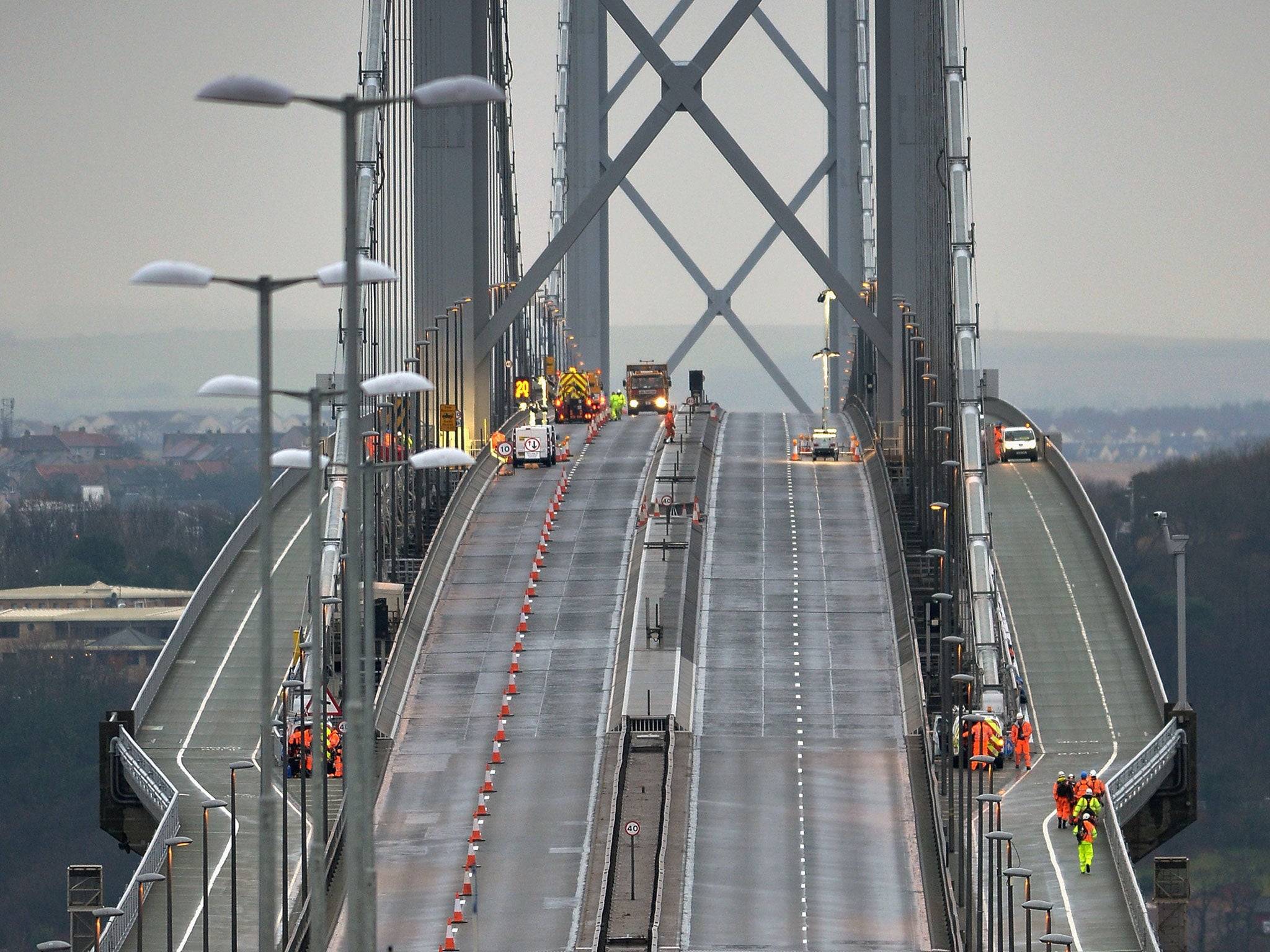Forth Road Bridge company made savings of more than £2m helped by underspending on maintenance
Exclusive: Bridge at centre of a row over who is to blame following its closure on after a 2cm crack was discovered

The body that ran the Forth Road Bridge until June when it was taken over by a private company made savings of more than £2m in the last financial year helped by underspending in several areas including maintenance, The Independent can reveal.
Despite having its funding slashed from almost £17m in 2012 to just over £9m last year, the Forth Estuary Transport Authority (FETA) made overall savings of £2.2m against budget. Although the authority received a one-off compensation payment of almost £3m, other savings were due to underspends over a number of areas including legal fees, bridge maintenance and weather emergency, Audit Scotland’s report of FETA’s 2014-15 accounts show.
The bridge is at the centre of a row in Scotland over who is to blame following its closure on 4 December after a 2cm crack was discovered in a truss under the carriageway.
Robert McCulloch, the engineer who found the fault, called the discovery “just one of those things”. Many others called it a “massive blunder”, blaming cuts of 65 per cent to the bridge’s maintenance budget by the SNP’s Finance Minister John Swinney in 2012. Others said the bridge had suffered from “wilful neglect”. First Minister Nicola Sturgeon was forced to deny those cuts were the reason behind the closure. She also said it was “absolutely, unequivocally not true” that maintenance budgets had been cut in the hope that the current bridge would last long enough for the £1.4bn Queensferry Crossing to open at the end of next year.
After two weeks of bitter rows, the Infrastructure and Capital Investment Committee agreed on 16 December to hold an inquiry into the crisis after the bridge reopens in January, and said that the core focus should be the structural defect behind the closure.
Officials from bridge operator Amey, who now manage and maintain both the existing Forth Road Bridge and the new Forth Crossing on behalf of Transport Scotland, Amey’s predecessor FETA, Transport Scotland staff and Transport Secretary Derek Mackay will be questioned.
Mr Mackay has been accused by opposition MSPs of “misleading Parliament” over the bridge, one of the most important road routes in Scotland carrying 24 million vehicles a year. In a statement on the day the bridge closed, Mr Mackay said that the defects “are problems that have only occurred in the last number of weeks”. However, a few days later, he was forced to admit that work cancelled on the Forth Road Bridge five years ago would have fixed the faulty section that caused its closure, and seemingly pointing the finger at FETA.
The former Scottish Labour MP Tam Dalyell waded into the debate on 17 December, berating politicians for attempting to deflect blame elsewhere. In a letter to The Independent, he said: “Attempts to shove the blame on to officials of Transport Scotland, who advised a strengthening programme, only to have their advice accepted and then immediately overturned, are contemptible. Shame on Holyrood politicians.”
A spokeswoman for Transport Scotland said Scottish ministers invested £98m in FETA since 2007 and more than £110m was spent. They denied any strengthening programme had been “overturned”. She said: “FETA undertook a successful trial to strengthen truss end brackets in May 2015 and this work has been continued by Amey. Specialist independent engineers have confirmed that the current defect is unrelated to the ongoing repairs.
“FETA were under no instruction to make savings and all critical works brought forward by FETA were fully funded. Our clear priority must be focusing our attentions on reopening the bridge as soon as possible while ensuring comprehensive travel plans are in place to mitigate the impact on the travelling public.”
Join our commenting forum
Join thought-provoking conversations, follow other Independent readers and see their replies
Comments
Bookmark popover
Removed from bookmarks